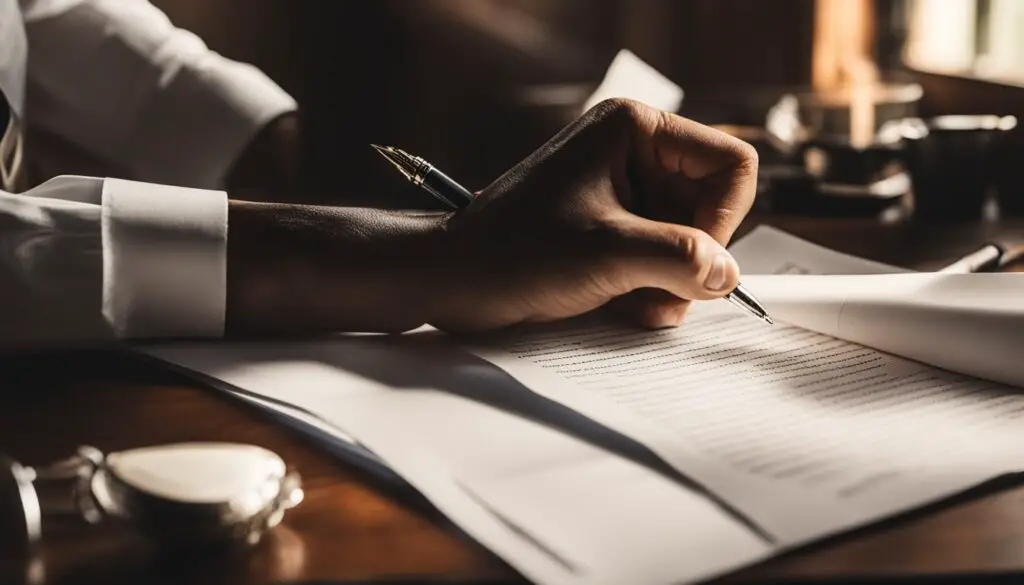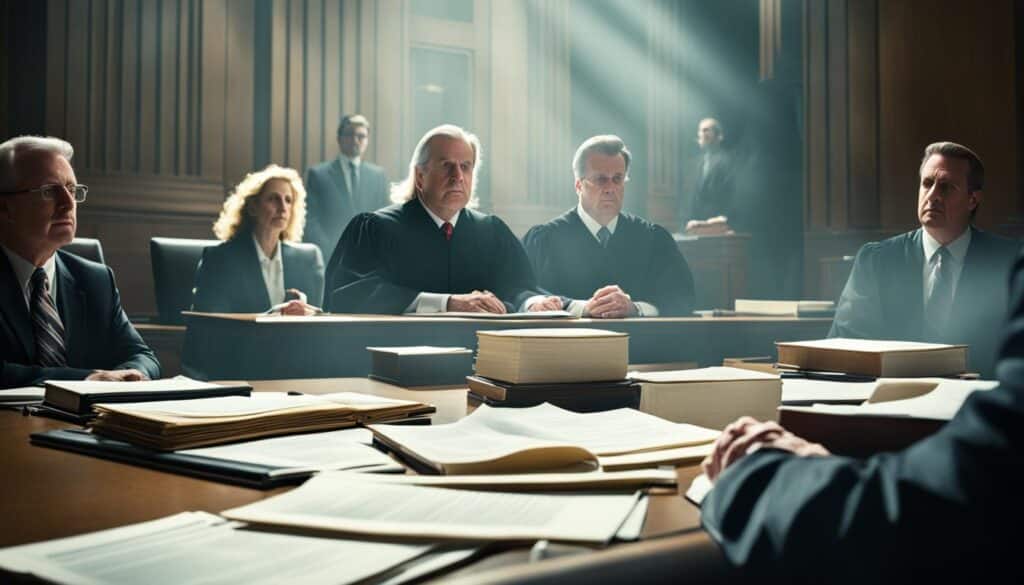
Legal experts know that writing clear legal documents is vital for success. They must be easy to read and understand. This is key when creating contracts, simplifying legal words, or making strong points. Good legal writing builds trust and helps clients win.
First, you need to know the aim of legal writing to get good at it. It’s not just about big words. It’s about sharing tough legal ideas in easy words. Adding proof and avoiding mistakes in your writing make your point strong and convincing.
How you organize your writing matters a lot. Tips on structure can guide professionals to present their ideas logically and clearly. Choosing words carefully, knowing how to edit well, and adjusting your writing for who is reading it are smart moves when aiming for persuasive documents.
Today, technology is a big part of writing in the legal field. Tools for research and software for writing documents can improve the writing process. Using these tools can make your work better and save time.
Key Takeaways:
- Legal writing is the cornerstone of success for legal professionals.
- Crafting well-written, persuasive legal documents is crucial for building strong legal relationships.
- Understanding the purpose, organizing effectively, and tailoring writing to different audiences are essential skills in legal writing.
- Incorporating supporting evidence, avoiding common pitfalls, and using language effectively are key elements in crafting persuasive legal documents.
- Utilizing technology can enhance the legal writing process and make it more efficient and effective.
Navigating the Criminal Litigation Process
Criminal litigation is a complex process. You might get involved in a case at some point. It’s important to know the steps in a criminal lawsuit to handle the legal system well.
Hiring a skilled criminal lawyer is key when you’re in a lawsuit. They can protect your rights and ensure you get a fair trial. Knowing what to look for in a good law firm matters a lot when you’re picking legal help.
Steps you should take in a criminal lawsuit include protecting your rights and working on a strong defense:
- Exercise your right to remain silent
- Gather relevant documents and evidence
- Follow the advice of your lawyer
Here are some expert tips for successful criminal cases:
- Hiring an experienced lawyer
- Thoroughly reviewing evidence
- Preparing for trial
- Maintaining a professional demeanor
- Staying informed
- Seeking support
In criminal cases, common challenges include not enough evidence and emotional stress. A criminal lawyer helps by looking at evidence, making defense plans, and representing you in court.
Choosing the right criminal lawyer means doing your homework, asking for advice, meeting for talks, and feeling a connection.
The Criminal Lawsuit Process
| Step | Description |
|---|---|
| Arrest | The person is taken into custody by the police. |
| Arraignment | The accused learns the charges and enters a plea. |
| Pre-trial motions | Both sides can ask the court to decide legal matters before the trial. |
| Discovery | Both sides share evidence to get ready for the trial. |
| Trial | A judge or jury decides if the accused is guilty or not. |
| Appeals | If they don’t like the trial’s result, the accused can appeal to a higher court. |
Empowering Yourself in Criminal Litigation
Empowering yourself in a criminal case is key to a good ending. Understanding the law, protecting your rights, and choosing wisely are crucial. Get to know the case’s details from arrest to trial. This will help you move carefully through each step and make smart choices.
Hiring a legal expert makes a big difference. A good lawyer will lead you through your case, making sure you know your rights. They’ll create a strong plan to defend you. Your attorney will make sure you’re treated fairly every step of the way.
Learning from top law students can also help. They know how to write convincing legal arguments and speak clearly in legal settings. By studying their work, you can improve your own abilities. This can help you get the justice you’re looking for.
Dealing with the legal system is hard, but you can do it with the right help. Taking charge of your legal position is important. So is having a great lawyer and looking to those who have won before. These steps help you stand up for yourself during the legal process.
FAQ
What is legal writing?
Legal writing means creating clear and persuasive legal documents like contracts and briefs. It uses legal terms but explains complex ideas in simple terms.
Why is legal writing important for legal professionals?
Legal writing is key for lawyers’ success in and out of court. It helps with building relationships, drafting clear contracts, and making legal terms easy to understand.
What are some tips for effective legal writing?
For good legal writing, know why you’re writing. Have clear and brief arguments with evidence. Avoid common mistakes.
Also, organize well, choose words precisely, and use tech for better writing.
How can I tailor my legal writing to different audiences?
To adjust your writing for different readers, think about what they know. Use simple language and explain new legal terms clearly. This makes your writing more accessible.
What is the role of a criminal litigation lawyer?
A criminal litigation lawyer represents people in criminal cases. They use their legal knowledge to protect their clients’ rights. They fight for a fair trial, analyzing evidence and building a strong defense in court.
What are the steps involved in the criminal lawsuit process?
A criminal lawsuit starts with arrest and includes arraignment and pre-trial motions. Then, there’s discovery, a trial, and possibly appeals. Each step has its rules, so it’s crucial to understand the whole process.
How do I find the right criminal litigation lawyer?
Finding a good criminal litigation lawyer means doing research and getting recommendations. Meet for consultations to check their skills and see if they’re a good match for your case. It’s also about feeling comfortable with how they communicate and handle your case.
What are some expert tips for successful criminal litigation?
Success in criminal litigation comes from hiring a skilled lawyer and checking every piece of evidence. Be ready for trial, act professionally, and keep informed. Getting support from professionals and groups is also vital.
How can I empower myself in criminal litigation?
To empower yourself during litigation, learn about the process and your rights. Get a lawyer you trust and use available help and resources. You play a big part in your case’s success.
Source Links
- https://www.joinleland.com/library/a/secrets-to-successful-legal-writing-a-comprehensive-approach
- https://www.linkedin.com/pulse/unveiling-secrets-criminal-litigation-expert-tips-success-biatlegal-po4pc
- https://digitalcommons.law.seattleu.edu/cgi/viewcontent.cgi?article=1384&context=faculty









